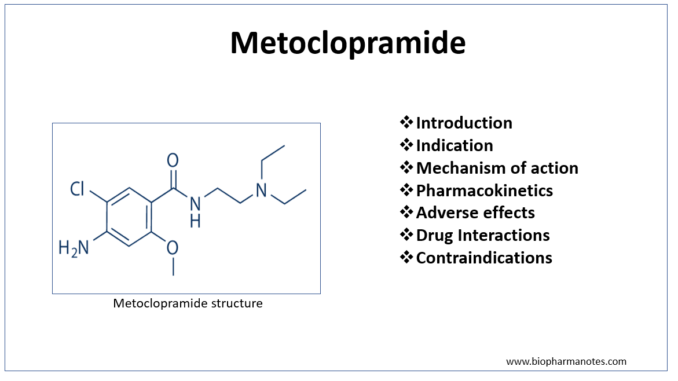
- Metoclopramide is a prokinetic drug and is commonly used antiemetic. It was introduced in early 1970s as ‘gastric hurrying agent’.
- It is a substituted benzamide and is chemically related to procainamide. However, it’s pharmacological activity are different than of procainamide.
Indications of Metoclopramide
- It is effective anti-emetic in post-operative vomiting, drug induced nausea and radiation sickness.
- To treat nausea and vomiting in patients with gastroesophageal reflux disease or diabetic gastroparesis.
- To control nausea and vomiting in chemotherapy patients.
- Used during emergency anesthesia to clear gastric contents. Also effective in emergency anesthesia required during pregnancy.
- In facilitation of duodenal intubation and endoscopy.
- In migraine.
- Used in diagnostic radiology of small intestine, it helps by reducing time required for barium to reach cecum and hence less films are required.
Mechanism of action of Metoclopramide
- Its mechanism of antiemetic action includes dopamine receptor antagonism, 5-HT4 receptor agonism, central and vagal 5-HT3 antagonism and also sensitization of muscarinic receptors of smooth muscle.
- It blocks central and peripheral dopamine receptors in CTZ (Chemoreceptor Trigger Zone) and induces central inhibition of vomiting. CTZ is major sensory relay station in afferent vomiting pathway. It is stimulated by drugs like apomorphine and alkylating agents.
- Its antiemetic effect is also due to its prokinetic activity. Also promotes forward propulsion of contents of upper GI tract, particularly of stomach. This is due to its action of 5-HT4 receptors.
Pharmacokinetics of Metoclopramide
- Administered via oral or parenteral route (IV or IM). Rectal or intraperitoneal route can also be used.It is absorbed rapidly after oral administration. The onset of action starts within 30-60 minutes of oral administration. It acts within 10 minutes after IM administration and within 2 minutes after IV administration. It is usually administered before meal or before sleeping.
- Metaclopramide is metabolized in liver by dealkylation and amide hydrolysis. Its plasma half-life is around 4-6 hours. It is excreted via urine.
- Its duration of action is 1-2 hours.
Adverse effects
- The major side effects are extrapyramidal effects occurring in about 1% of patients. It can cause dystonia, parkinsonism like syndrome which may occur several weeks after initiation of therapy. This is usually treated by stopping therapy or by using diazepam or benztropine if necessary.
- Chronic use of metoclopramide may cause tardive dyskinesia. A black box warning was issued by FDA in 2009 regarding long term or high dosage of metoclopramide due to risk of tardive dyskinesia.
- It can also cause drowsiness, skin rashes, lassitude, diarrhea. It can elevate prolactin level leading to hyperprolactinemia which can cause gynecomastia, amenorrhea, galactorrhea, hypogonadism and impotence.
- Its overdose in infants may cause convulsions, irritability and hypertonia.
Drug Interactions
- As it speeds up gastric emptying process, it increases rate of absorption of may drugs like aspirin, tetracycline, pivampicillin, paracetamol and diazepam. Concurrent administration with phenothiazine and butyrophenones may potentiate extrapyramidal side effects.
- It reduces therapeutic effect of levodopa due to its antagonistic effect on dopaminergic receptor of basal ganglia.
Contraindications
- Contraindicated in patient with GI bleeding, GI obstruction or GI perforation.
- It is contraindicated in patient with Parkinson’s disease or with history of tardive dyskinesia.
- Contraindicated in pheochromocytoma as it causes release of catecholamines and deteriorate pheochromocytoma.
- Contraindicated in patients with seizure or depression due to risk of worsening the condition.
References
- https://www.ncbi.nlm.nih.gov/books/NBK519517/
- Pinder RM et al. Metoclopramide: A Review of its Pharmacological Properties and Clinical Use. Drugs volume. 1976; 12: 81–131.
- Rao AS et al. Review article: metoclopramide and tardive dyskinesia. Aliment Pharmacol Ther. 2010; 31(1): 11-9.
- Pharmacology and Pharmacotherapeutics. 24th edition.
- Goodman and Gillman Manual of Pharmacology and Therapeutics.
- Essentials of Medical Pharmacology. 7th edition.
- A Textbook of Clinical Pharmacology and Therapeutics. 5th edition.